How Much is Higher Education Worth?
December 23, 2019
“It tends to be ingrained from a very young age that we have to go to college and we have to go into a good school to get anywhere in life, and that a college degree is all that matters,” says one anonymous BCA student. “We’re told this by our parents and teachers, and pretty much every adult around us. There’s no other option – you can’t be successful without going to college.”
At our school, there is a spectrum of ideas regarding college; some see it as a means of self-development and self-improvement, while others simply see it as a criminally overpriced way to set foot into the modern economy. Nonetheless, there seems to exist a popular opinion that while college is useful, it is not always necessary, and it is not the one path to success and happiness.
The concern and interest in college education is not an isolated issue within BCA. In 2019, there were multiple scandals across the globe related to the college admissions process. In the United States, the college admissions bribery scandal, dubbed “Operation Varsity Blues,” erupted when federal prosecutors in Boston and the FBI and became aware of the bribery and fraud behind the college admissions of several high school students. Thirty-three wealthy parents of college applicants and many university sports coaches conspired to create fake qualifications for their children. Likewise, in South Korea, a country known for its infatuation with higher education, former Justice Minister Cho Kuk’s daughter has been investigated for her fabricated qualifications that played an influential role in her acceptance into an international high school, college, and medical school. Cho’s wife, Chung Kyung-shim, played a pivotal role in fabricating documents to guarantee her daughter acceptance into medical school along with a scholarship.
According to Google Trends, the search term “college” experiences spikes during the months leading up to the US college admissions process. This sudden increase is not just in the United States, but worldwide, demonstrating society’s interest in higher education.
Within the United States, from 1990 to 2015, there was a 40% increase in the total college enrollment rate at 2- and 4-year colleges and universities. This increase indicates a gradual increase in interest in higher education within the span of a few decades. Not only have enrollment rates risen, but there has also been a drastic increase in the number of SAT-test takers, as well as an increase in the SAT scores themselves. In 2017, 1.7 million students took the SAT. In 2018, there were 2.1 million students who had taken the SAT, indicating the increase in emphasis on the SAT as a key part of admissions to top schools.
At BCA, the majority of the student body believes in the value of higher education. In this school-wide survey, the majority of the respondents were freshmen, and the medical academy had the greatest number of respondents. The majority of BCA students said that they wanted to go to a 4-year college, and many students across all four grades, had either already taken or planned on taking the SAT and/or ACT. When asked if they thought their peers were also concerned about college, the majority of respondents also said that they believed their peers also highly valued college. 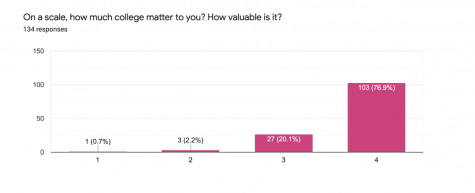
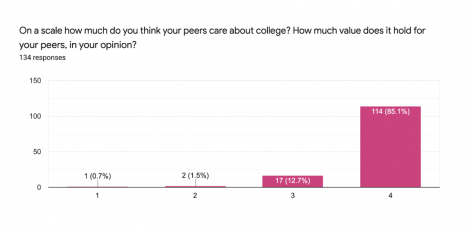
BCA students either responded with a “2” or “3” when asked how much of their time was spent thinking about college on a scale from 1 to 4. A “1” means the student did not think about college at all, while a “4” mean the student constantly thinks about college. A majority of BCA students also said that they cared about their grades quite a lot when considering the prospect of attending a college or university. 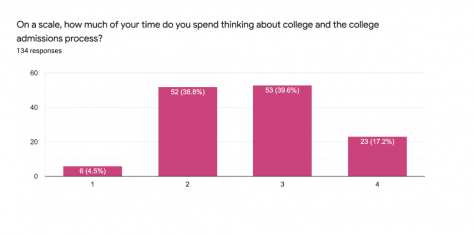
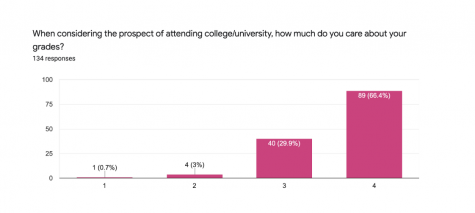
Another aspect to consider with regards to valuing admissions to a certain university, is the need to fulfill all the admissions requirements. AMST junior Aaron Thammavongxay said: “I think at BCA specifically, there’s way too much of a focus on college and essentially cultivating your college application on day one. I find that too many people have a lot on their plate or do activities that they may not enjoy simply because it looks good on their college resume. At BCA, especially with the drive that many students have, these feelings are amplified.” In response to this survey, the majority of BCA students expressed that they cared about their extracurriculars specifically because of college admissions requirements/standards.
When comparing the views expressed by BCA students and the rest of the nation, there are some engrossing similarities and differences. In a study conducted by the Pew Research center, the majority of college graduates view their college education as a mostly rewarding experience. 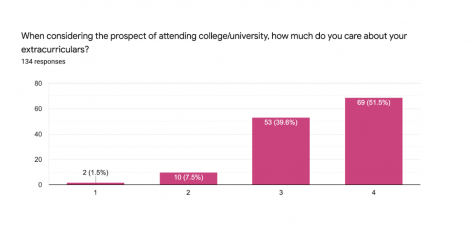 In the survey, 49% of these college graduates believed that their college education was “very useful” in “helping them develop specific skills and knowledge that could be used in the workplace.” In addition, 62% responded that college was “very useful” with regards to “helping them grow personally and intellectually.” Similarly, at BCA, there were many positive views regarding the value and outcome of a college experience.
In the survey, 49% of these college graduates believed that their college education was “very useful” in “helping them develop specific skills and knowledge that could be used in the workplace.” In addition, 62% responded that college was “very useful” with regards to “helping them grow personally and intellectually.” Similarly, at BCA, there were many positive views regarding the value and outcome of a college experience.
Alongside the benefits of attending university, there are also more practical reasons for choosing to further one’s education. According to a study conducted by the National Center for Education Statistics, in 2018, young adults (25- to 34-year-olds) with a bachelor’s or higher degree had an employment rate of 86%, while the employment rate for young adults with only a high school diploma was 72%. 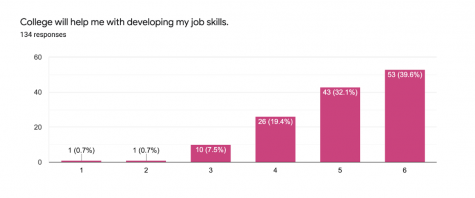 In corroboration with this notion that college can bring economic benefits, a study conducted by the Associated Press-NORC Center for Public Affairs Research found that more than half of Americans ages 13 through 29 believe that college will lead to economic success. However, in the same study, half of the respondents
In corroboration with this notion that college can bring economic benefits, a study conducted by the Associated Press-NORC Center for Public Affairs Research found that more than half of Americans ages 13 through 29 believe that college will lead to economic success. However, in the same study, half of the respondents 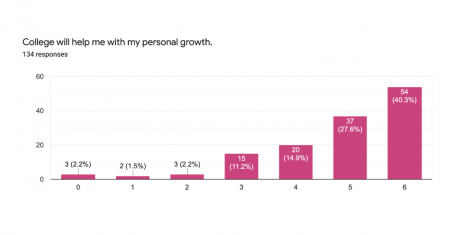 said that their high school education was sufficient to get a good job. In fact, 45% believe that a high school diploma was enough to earn a living in today’s economy and society. This serves a stark contrast to the beliefs of BCA students.
said that their high school education was sufficient to get a good job. In fact, 45% believe that a high school diploma was enough to earn a living in today’s economy and society. This serves a stark contrast to the beliefs of BCA students.
According to an anonymous respondent of the survey, “In today’s world, college is really emphasized and is seen as a necessity. People see college as a safety net or a guarantee that you’ll get a job in the future, and I do view college somewhat in that way.”
Not only do BCA students view college as a necessary means of bettering themselves, but they also view college as a necessary means of bettering their future, which entails a stable job with a good employer. 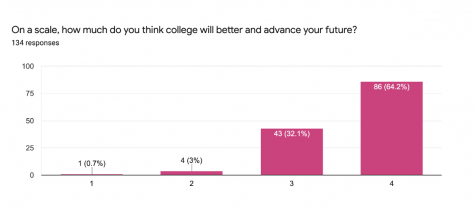 Students here associate college with a good future; that relationship offers an explanation as to why many students here are so concerned with their grades and extracurriculars as well as getting into a “good school.” One anonymous survey respondent offered, “college and higher education are seen as very crucial in today’s society in terms of getting employed, starting a business, or just in matters of status in everyday life.”
Students here associate college with a good future; that relationship offers an explanation as to why many students here are so concerned with their grades and extracurriculars as well as getting into a “good school.” One anonymous survey respondent offered, “college and higher education are seen as very crucial in today’s society in terms of getting employed, starting a business, or just in matters of status in everyday life.”
Another perspective from another anonymous respondent was the idea that “college is important to how society views someone and their accomplishments.” 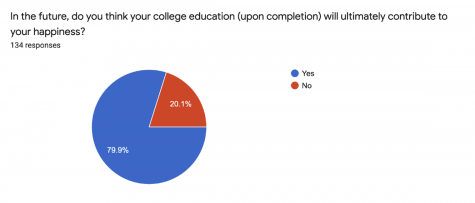
Yet ultimately, the majority of BCA students do view college as an institution and experience in their lives that will contribute to their personal happiness—an undeniable value of higher education that still stands despite a range of views regarding admissions and the costs of a college.





